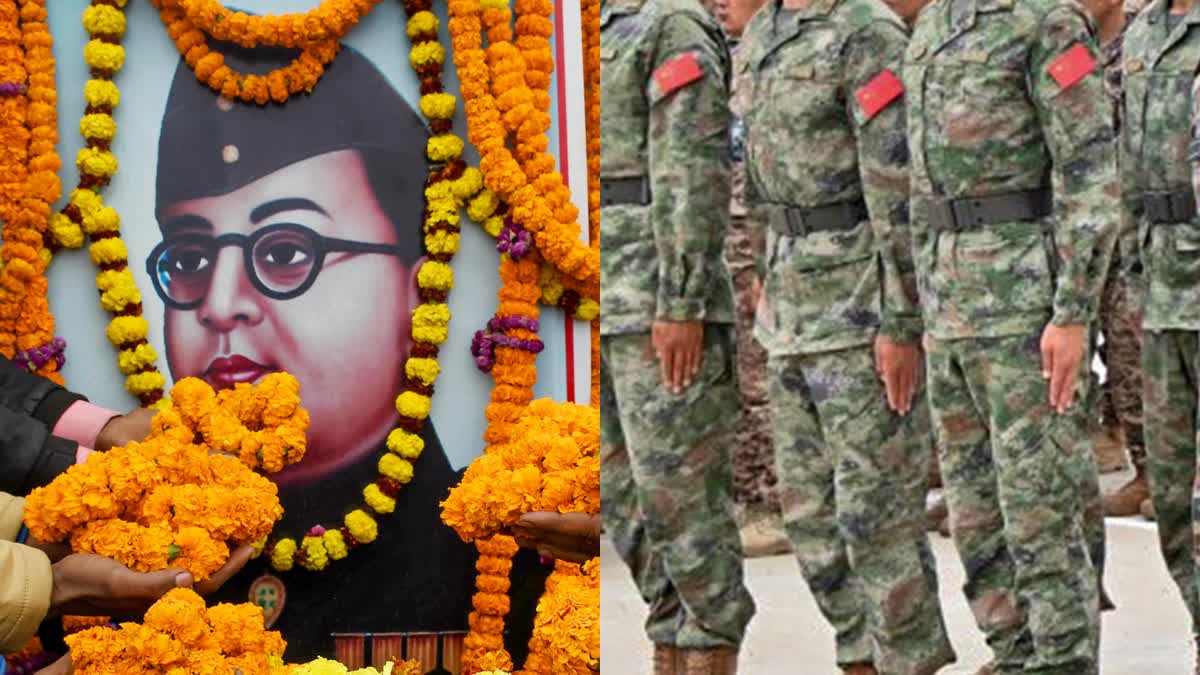Jabalpur (Madhya Pradesh): As India celebrates the 78th Independence Day on Thursday August 15, 2024 to commemorate the end of over 200-year British colonial rule in 1947, a mass rebellion by the soldiers of the Azad Hind Fauj in Madhya Pradesh's Jabalpur the preceding year is rarely discussed with the unsung heroes of the Subhas Chandra Bose led Indian National Army slipping into oblivion.
What Sparked The Rebellion?
Jabalpur has a special contribution in the freedom of India. When a sedition case was filed against the soldiers of Azad Hind Fauj, the soldiers of the Army's Signal Corps revolted in Jabalpur. Historians say that the British were scared after this military revolt in India and the script of independence was written soon after this revolt, but the soldier revolt was not given much space in Indian history.
In November 1945, a sedition case was being run against the soldiers of the Azad Hind Fauj in the Red Fort and during this trial, speculations were rife about the British sentencing the soldiers to life and even death.
Mass Revolt By Soldiers
The trial against the soldiers of the Azad Hind Fauj had a deep impact on the soldiers of the Indian Army. There were soldier revolts at many places in the country. In Jabalpur too, the trial was being closely watched especially by the ranks of the Azad Hind Fauj. Jabalpur-based Signal Corps, a unit of the army was getting minute to minute updates about the trial happening in Delhi.
Azad Hind Fauj Soldiers Chant Netaji's 'Jai Hind' Slogan
The pent up anger among the soldiers of the Indian Army against the ongoing case against the soldiers of the Azad Hind Fauj reached the threshold and on 22 February, 1946 in Jabalpur, the anger burst out with the slogan of 'Jai Hind' coined by the founder of the Azad Hind Fauj Netaji Subhas Chandra Bose. Soldiers of the Signal Corps in Jabalpur, Havildar Krishnan, Havildar Jagat Singh and Gyan Singh are believed to be the first who came out of their barracks chanting Jai Hind. Soon, along with these three soldiers, about 500 soldiers of the entire battalion joined the bandwagon shouting Jai Hind loudly and they left the cantonment. This contingent of 500 soldiers soon reached 1700 soldiers. Apart from the soldiers working in the army, clerks and officers and employees of other departments also joined the movement leaving the British terrified.
Revolt Spills To Jabalpur Streets
A big event in the history of India was unfolding in Jabalpur on 22 February 1946 as the Azad Hind Fauj soldiers started coming out of the cantonment towards the city. The soldiers announced a march towards the Kamaniya Gate and Bada Fuhara of Jabalpur where head of Azad Hind Fauj, Subhas Chandra Bose was to deliver a speech.
Jabalpur Congress President Welcomes Rebel Soldiers
Before these soldiers shouting Jai Hind could reach Bada Fuhara, Jabalpur Congress city president Bhavani Prasad Tiwari and Ganesh Shankar Nayak reached the pond of Tilak Bhumi to welcome the rebel soldiers. The soldiers were told to carry on their movement peacefully, and they were also shown a letter from Maulana Abul Kalam Azad which asked the soldiers not to revolt in the larger interest of the impending independence. The soldiers started returning to their barracks, but the movement continued till 28 February.
Case Filed Against Soldiers
Jabalpur was a major base of the British and the revolt by the soldiers left the British scared. The British prepared for court martial proceedings against the rebel soldiers. When the case was filed against the soldiers of Jabalpur, Jabalpur advocates Kunjilal Dubey, Asgar Ali, Sardar Rajendra Singh pleaded on behalf of the soldiers. Kunjilal Dubey argued that chanting 'Jai Hind' was not against anyone and there was no harm in hailing one's country. But despite the strong argument, the jobs of 90 soldiers were terminated by the British. They were put in jail, their salary and pension were stopped.
Significance Of The Revolt
Historian Satish Tripathi said that the Jabalpur rebellion played a key role in India's Independence and the one which left the British terrified.
“Jabalpur rebellion was a rebellion of the army. Before this, there was a rebellion in the Navy and the Air Force, but the British were afraid that if the rebellion started in the Army as well, then how would they handle it. At that time, the British did not have enough British soldiers to control this rebellion, so in a hurry, a letter was written to the then British Prime Minister Clemen Attlee that now the British staying in India is not free from danger and the British will have to leave India as soon as possible. After this incident, the British Prime Minister announced the Cabinet Mission and in March the Cabinet Mission came to India and decided that India would be given independence not in 1948 but in 1947," Tripathi said. He said that the Jabalpur military rebellion did not get a “proper place in history”.



